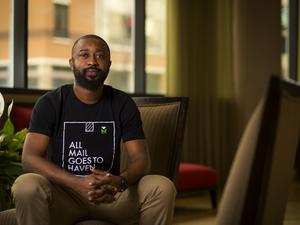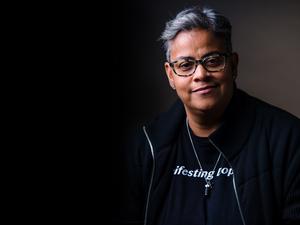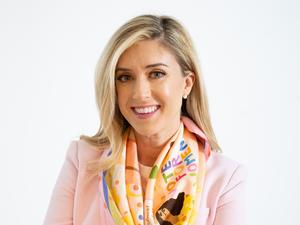
You have to be undeniable.
That's the stark reality many female founders are facing when trying to raise venture capital, according to Natalia Bishop.
She knows this both from personal experience — she founded Story, a Louisville coworking community, and Level Up, a lifestyle-turned-edtech startup — and the shared experiences of her peers.
"You have to be undeniable. That's the difference [between male and female founders] — I cannot go and raise (money) with a back-of-the-napkin sketch. I cannot go raise with an idea," Bishop said. "I am not afforded the opportunity to try to prove myself and fail. If I fail then game over, right? Game over because no one will ever fund me again."
That gender disparity is evident in recently released data from PitchBook.
It was a banner year for venture capital in 2020 with the U.S. startup ecosystem bringing in 16.2% more venture dollars than in 2019. Yet despite the larger pie, women founders got an even smaller slice last year, according to PitchBook's report.
Venture dollars invested in female-founded companies fell by 3% and deal count fell by 2.2% in 2020. That trend has been largely reversed in 2021, but massive inequities persist in between genders and race.
It's not because companies founded by women are producing lower returns than those founded by men. In fact, the opposite is true.
According to PitchBook's data, female-founded companies exited for a combined $24.1 billion, about 32% higher than in 2019, while the overall market increased by only 8%. The same outperformance is happening in 2021, with $58.8 billion exited by female-founded companies so far is 143.6% higher than 2020’s level, while the overall market is up 101.5%.
An exception to the norm: Health-tech
In Louisville, there's only a few startups with female founders that have raised $1 million or more in the last year.
One of those is RxLightning. The health-tech startup is definitely an anomaly in Louisville, and perhaps nationally.
RxLightning, which digitizes and automates the enrollment process to get patients started on specialty drug regimes, launched in January 2020. It secured $1 million in an oversubscribed seed round by August 2020, then raised an additional $2 million earlier this year.
Along the way, it attracted high-profile industry leaders to its board, grew to 15 employees and saw rapid adoption among providers, tech partners, specialty pharmacies and manufacturers.
It's the kind of unprecedented success that most startups just don't see in a year and a half.
Julia Regan, co-founder and CEO of RxLightning, admits that her experience raising capital has been different than most female founders, partly because of the company's industry. According to PitchBook's report, female-founded companies within the health care industry (excluding biotech and pharmaceuticals) have raked in $7.8 billion so far in 2021, a 106.3% increase over 2020 numbers, and is on pace to reach $10 billion by the end of the year.
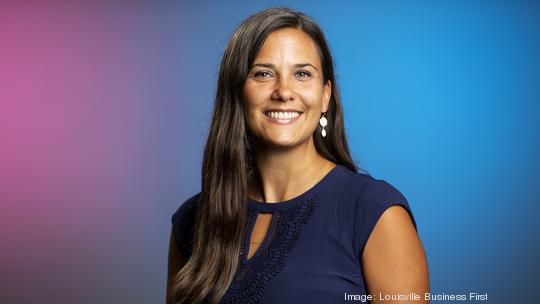
Another local health care company, eBlu Solutions, got $11.4 million in a Series A round this spring. While it's led by CEO and co-founder Mark Murphy, it has a female co-founder in COO Kim Farley.
RxLightning and eBlu Solutions are XLerateHealth (XLH) portfolio companies. Jackie Willmot, CEO and co-founder of the accelerator, said XLH's female-founded portfolio companies have been very successful in raising capital, and she hasn't noticed a statistical difference between them and their male counterparts.
"More than a quarter of our companies have female founders/CEOs, and those women-led startups have raised over $60 million," she said, adding that amount represents 25% of the total dollars raised by XLH portfolio companies. "More importantly, the four largest capital raises in our portfolio were by companies which had female founders/CEOs. Two of these companies [RxLightning and eBlu Solutions] are from the Kentuckiana region."
Willmot noted those four companies raised the bulk of their capital nationally.
When approaching investors, Regan said her strategy as a first-time founder has been to tell the story of RxLightning — what it's doing, how it's doing it and how she and her team are the best people to execute it.
"At the end of the day, my gender shouldn't matter," Regan said.
Between the two rounds, Regan said she's been fortunate to find investors that are more than happy to invest in a woman-led company. She also believes her eternal optimism and confidence that RxLightning will be successful comes through in meetings with investors.
That self-assurance and assertiveness is something more female founders need to have when they walk in to these pitch meetings, Regan said.
"When I've talked to other female entrepreneurs about how we present ourselves, it's more of this internal struggle that women have around the ask," she continued. "If we believe in our business and we are going to market with that business concept, we shouldn't be afraid to ask for what we want and what we deserve, regardless of our gender."
RxLightning is preparing to open a Series A in 2022. Regan said as the company grows, the story becomes less about the passion, the vision and the founders, and more about its market size, traction and ability to scale strategically.
"Fundraising isn't something that I think is easy for anybody, regardless of how successful they've been or not," she said. "But I'm confident that we're going to be able to secure a large amount of capital based on what our needs are."
The problem(s)
Regan is a great example that raising capital as a female founder and CEO is doable, Bishop said. But her experience as a white woman is vastly different than Bishop's experience as an immigrant from Colombia.
"When you have these unique examples of typically white women that are able to raise capital in a quick way and close on rather big rounds, it signals to people, 'Well, she did it as a female founder so you can too,'" Bishop said. "What we fail to see is all the other circumstances that go into it when it comes to founders of color that are also female.
"The argument is that 'a good idea will get funded.' And that's the biggest cop-out in my opinion."
Did you know? There have only been 103 Latina founders globally that have been able to secure more than $1 million in venture capital, according to a database created by Latinas in Tech.
The point being, while it's possible, it's much harder to do so if you're not in the right industry or if you don't have the right network, she continued. Through her work within the local entrepreneurial ecosystem, Bishop believes she's garnered a good amount of social capital, but it doesn't always translate to local investment dollars.
"I felt like I had gotten more traction with out-of-town investors that didn't really know me," she said. "In a way, I felt as if I got discounted a little bit because people didn't understand how people can build several things at the same time."
Annette Miller, co-founder and CEO of Enriched Couples, also saw more traction by looking to investors outside of the region. But she said she didn't realize that until it was too late.
The Vogt Award-winning fintech company aimed to help couples measure, grow and track healthy relationship habits with unified financial decision-making through its scientifically developed platform that uses a psychology-based methodology.
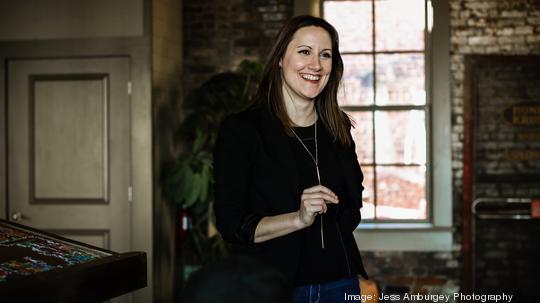
"At the very beginning, I thought, 'OK I'm gonna go fundraise,' and I really was quite naive," she said. "It just occurred to me during the pandemic — when my network became primarily founders and investors from outside our region — that I don't think I ever once was told by local people that I should and will necessarily need to go outside the region to even be able to realistically fill a fundraising round."
After three years of bootstrapping and building the company, Miller was confident she could have closed on a round this year with the reception she's received in other markets. But she said the time it has taken her to get to this point has drained her energy.
"I was finally so close to being able to raise a round, but I realized after three years of feeling lonely, unsupported and frustrated that even if I did finish raising the round, I was going to be so burnt out that it would have meant the death of the business once and for all," Miller said.
For now, Miller is hitting pause on Enriched Couples for that very reason, and is pursuing a new opportunity. While details on that are not yet available, she said peer-to-peer support has always been the thing that's kept her moving forward and she's excited to continue supporting her fellow founders in a new way in 2022.
The solution(s)
Bishop is also working to change that narrative for the women that come after her through her roles as director of innovation and entrepreneurship at University of Louisville, entrepreneur-in-residence at Amplify and as an emerging investor herself.
To remedy some of the aforementioned disparities, Bishop said investors can immediately take action by revising their thesis and their process, making it very clear and accessible to the founder so they can see what their metrics are and if they are a right fit.
Regionally, Bishop said she's noticed some firms say they are impact or early-stage funds, but they are asking for metrics more along the lines of Series A or bigger growth-stage rounds.
"If you're an early-stage investor or angel group and your thesis says something like, 'You have to be profitable,' or you're asking founders to de-risk the investment completely, you're doing something wrong," she said.
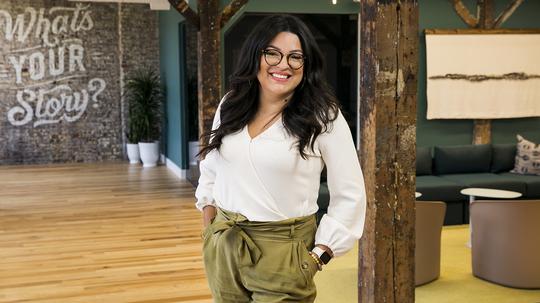
But the most impactful thing investors can do is to start looking at women limited partners (LPs) and emerging general partners (GPs), she added.
About 15.4% of all U.S. GPs are women, up from 12% in 2019, according to PitchBook's report.
"It's not really that hard — it's 2021. Go figure out who are qualified women investors that can be a part of your LP group because they're going to help your blind spots if you don't have a female GP," Bishop said. "That would be something that I would be very intentional about if I was a white male or if I didn't really have a lot of female representation within my group."
Miller referenced Columbus-based Overlooked Ventures LP, led by founding partners Janine Sickmeyer and Brandon Brooks.
It's a firm focused on investing in diverse founding teams and raised enough in five months to back its first four startups, sister publication Columbus Inno reports. Founded in May, the fund has commitments of $8.5 million toward a two-year goal of $50 million and about 70% of its LPs are women.
"They're a great example of what I observe as a major trend that is shaping where aspiring VCs can go and the opportunities and paths they have available in their own careers," Miller said. "These emerging fund managers are really changing the shape of what VC is and who it serves."
